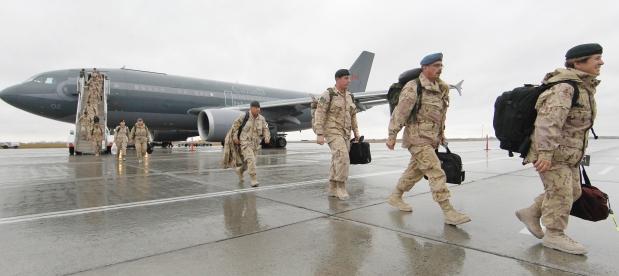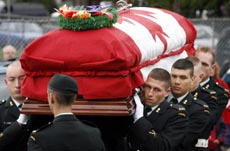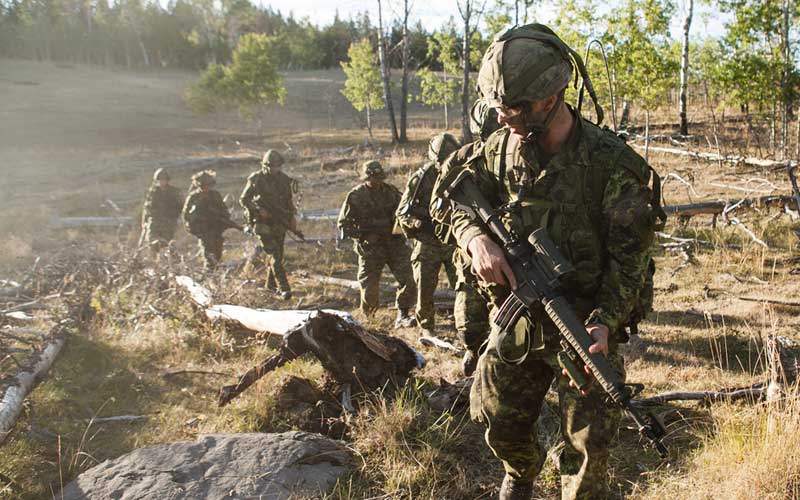Transitioning back to the civilian way of life after returning from a military position abroad is often a struggle for Canada’s soldiers. At the very least, the excitement of returning home is often accompanied by difficulties adjusting to a lack of routine and structure. At worst, many of our veterans return home from Afghanistan with a range of physical or psychological injuries making it more difficult to find meaningful work and resume their lives back home.
These problems are worsened by the frustration caused by the hiring freezes in government positions meant for returning veterans. In 2005, the federal government announced that returning veterans would be given priority for public service positions over other applicants. Between the program’s introduction in 2005 and September 2012, only 11.8% of soldiers who have been granted medical leave have managed to secure employment in the public service. Out of thousands of veterans that have returned to Canada in the past year, only 30 have been hired from March 2012 to April 2013.
[captionpix align=”center” theme=”elegant” width=”300″ imgsrc=”http://natoassociation.ca/wp-content/uploads/2013/09/soldierstarmac-266×266.jpg” captiontext=”Returning Soldiers”]
Most experts agree that it is crucial for veterans to be able to secure steady employment in order to make the difficult transition back to civilian life. Since the public service has been unable to meet the hiring needs of Canada’s returning military personnel, Veteran Affairs Canada (VAC) has been looking to companies in other industries to place veterans in their vacant positions.
VAC has partnered with private sector companies to create the Hire A Veteran (HAV) initiative, which aims to help veterans transfer their skillsets to successful civilian employment. Several companies have identified that while in the military, veterans often acquire unique skills and training that will prove extremely valuable in the workplace. Some of these skills include leadership, strategic planning, discipline, and the ability to work effectively in teams.
So far, several large organizations have expressed positive interest in hiring veterans. On September 11, 2013, Cenovus, an Alberta-based oil company, publicly announced their commitment to hiring returned veterans. This amounts to a form of preferential hiring, where between two equally skilled and qualified candidates, hiring managers will select the veteran. Cenovus’ commitment to the program is expected to have a huge impact, as the company currently employs over 5,000 workers.
With one oil and gas giant realigning their hiring policies to accommodate Canada’s veterans, other Canadian energy companies will hopefully follow suit. Oil and gas companies are constantly looking for opportunities to become involved in positive social initiatives to reduce the negative perceptions many Canadians have of their operations. In addition, the need for skilled labour in the energy industry is expected to increase substantially and programs such as HAV are expected to help companies meet these expected demands.
[captionpix align=”left” theme=”elegant” width=”300″ imgsrc=”http://beaconnews.ca/wp-content/uploads/2011/12/military2.jpg” captiontext=”Job Fair”]
Along with HAV, another initiative worth mentioning is Helmets to Hard Hats (H2H), a non-profit organization that helps veterans acquire knowledge of skilled trades. This program helps veterans secure employment by accelerating the three year process of becoming certified in a trade. Similarly to Hire a Veteran, this organization hopes to both address labour market concerns and help veterans readjust to civilian life. So far, hiring numbers for this program have been low.
Initiatives such as HAV will hopefully go a long way to help veterans settle into a new way of life. However, a recent study has shown that although the majority of companies agree that employing veterans through preferential hiring policies is a good idea, many executives have mixed feelings about actually implementing these policies in their own companies. Those responsible with hiring applicants often admit to not knowing how to interpret veterans’ resumes and almost half of the survey respondents felt that a university degree would be more valuable to a company than the skills gained in the military.
It is evident that while the first challenge over the upcoming year will be to find other large-scale companies who are willing to set an example by introducing this policy, the second will be actually following through with these plans. We need to hold companies accountable to these promises and encourage them to conduct studies and profile successful veterans at their organizations. Publishing and reporting the positive results of hiring veterans will hopefully demonstrate that these workers add considerable value to their operations and encourage other companies to adopt similar policies.




